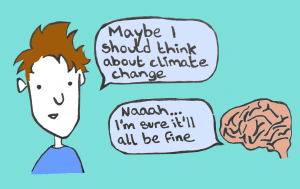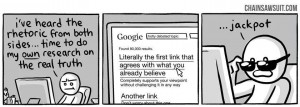Four ways your brain deceives you about the truth of Climate Change

March 18th, 2016
The Intergovernmental Panel on Climate Change (IPCC) have said it, the United Nations Framework Convention on Climate Change (UNFCCC) has said it, and now the most rooted for Oscar nominee ever, Leonardo Di Caprio has said it: “Climate change is happening right now. It’s the most urgent threat facing our species”. So with this penetration into the final frontier that is pop culture, the need to avert the catastrophic consequences of climate change must surely be at front and centre of all of our agendas? Not if your brain has anything to say about it.
As a species, we have evolved to deal well with short-term decision-making and threat management, but this ability deteriorates drastically as threats become more distant. Since people’s risk assessments of climate change deduce that it is something that will happen in the future and which will display its worst effects in other places, climate change is psychologically categorised, under these terms, as a distant threat. The field of psychology has identified a number of human processing trends – or cognitive biases – that stack the odds against the threat of climate change being taken seriously.
- Instant Gratification: “I WANT IT ALL, NOW!”
Classic studies on Instant Gratification – the inability to delay pleasure when the option for immediate satisfaction is present – show just how loaded our drives are towards the present time, with a result that we heavily ‘discount’ the future. The fact that we cannot postpone pleasure, even if future payoffs will be greater than those currently on offer, has clear consequences for dealing with climate change. The Tragedy of the Commons, a parable in which everyone takes more than their fair share of a common resource, leading to widespread depletion of the resource is often cited as a result of this. Trading the allure of the latest imported fashions, technologies or the succulence of your weekly steak for a stable climate and secure agricultural outcomes for your children are choices that are unlikely to be taken on a mass scale in a western consumer society that thrives on instant gratification.
2. Loss Aversion: “I don’t care what I might gain from a safer planet, I like how things are now”
Another psychological predisposition that prevents us from taking action to prevent climate change is that the desire not to lose is stronger than the drive to win, a tendency also referred to as ‘Loss Aversion’. Being expected to make sacrifices in the amount that we consume, own, fly, etc. – all framed as losses – in order to allow future life on the planet to thrive is too much to ask for many of us. We feel that we have worked hard to earn the lifestyle that we maintain and risking losing this and the status associated with it, in the name of an uncertain alternative, is a chance that we would rather not take.
3. Optimism Bias: “Sure it’ll be grand”
While this dislike of loss seems like an obstacle that could be easily overcome with a good dose of rational thinking, particularly considering the short-sighted definition of ‘loss’ – given what could ultimately be lost due to climate change – your brain works very hard to avoid the unpleasantness of rational thinking by enlisting other biases as back up. Just when you begin to worry about the scale of the global transition that is required to curtail climate change, an ‘optimism bias’ comes into play reassuring you that it will all be OK somehow. Whether it leads to down-playing the impacts of sea level rise or unpredictable growing seasons, or it invites notions of a last minute technological breakthrough that will solve the energy crisis and high greenhouse gas concentration in the atmosphere, this bias goes some way to allaying your fears.
4. Confirmation Bias: “I am open minded – about things I agree with”
Finally, if by some miracle you do take in some of the worrying information about the forecasted ecological crisis, and you make your way to some reading on the topic, a ‘confirmation bias’ will mean that you interpret new information in a way that is consistent with your existing beliefs. For example, starting an online search with the term “climate change hoax” is unlikely to give impartial results and any flaws or anomalies in a study on climate change (an inevitable feature of the scientific method) are likely to be touted by deniers of climate change as evidence of a conspiracy theory.
While cognitive biases can stop some of us from acknowledging the reality of climate change, it must be said that all of us fall foul of them. Supporters of mainstream climate science can just as readily fail to take on new information that is not compatible with their worldview. Where ideology and convenience clash with cold hard facts, we would benefit from taking a critical and objective look at how we are processing the evidence in front of us.
[x_author title=”About the Author”]









